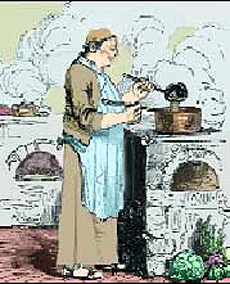March 2017

Volume I/ Issue 12 / March 2017


From the Editorial Desk:
Seeing that it is the month for St. Patrick's Feast day, I thought I would throw in a traditional recipe of something that is called "Colcannon" it is mashed potatoes with Cabbage and Kale with lots of butter! Now before you stick up your nose at it, you have to try it. It taste great! I also posted an hour of traditional Celtic/Irish instrumental music to play along as you are making it!
And that's not all! (Although at this point you might be wishing it was), I have a great Irish joke for you:
What do you call a Irish that stays out all night? (drum roll please)..... Patty O'Furniture!
Oh it only gets better! Last but not least is a wonderful story I found about St. Patrick that I would like to leave with you. But before I do let me remind you to read through this month's Olive Tree for some wonderful devotions for the lenten season written by some wonderful clerics!
 A Legend of St. Patrick
A Legend of St. Patrick 
Many times St. Patrick baptized hundreds of people on a single day. He would come to a place, a crowd would gather, and when he told them about the true God, the people would cry out from all sides that they wanted to become Christians. Then all would move off to the nearest river, or well, to be baptized. It was that way when Aengus was baptized. He was a Prince of Munster and when St. Patrick finished preaching, Aengus was longing with all his heart to become a Christian.The crowd surrounded Patrick as he prepared to baptize this important man. Patrick got out his book and began to look for the place of the baptismal ceremony but he found that his crosier was in his way. Patrick’s crosier had a metal spike on the end of it, and, when he began to search for the place in his book so that he could baptize Aengus, he stuck his crosier into the ground just beside him. But the crosier didn’t go into the ground; it went instead right through poor Aengus’s foot! Patrick, never noticing what he had done, went on with the ceremony. The prince did not cry out, or even moan; he went very white and that was all. Patrick poured the water over Aengus’s bowed head, saying, “In the Name of the Father, and of the Son, and of the Holy Spirit.” It was over; Aengus was a Christian. Patrick turned to take up his crosier and was horrified to find that he had driven the sharp spike through the prince’s foot. “But why didn’t you say something! This is terrible.Your foot is bleeding and you’ll be lame....”Poor St. Patrick was very unhappy. In a low voice, Aengus said that he thought having a spike driven through his foot was part of the ceremony. Then Aengus added something which must have brought joy to the whole court of Heaven and blessings on Ireland, “Christ shed His blood for me, and I am glad to suffer a little pain at Baptism to be like our Lord.”-Alice Curtayne. Twenty Tales of Irish Saints


A Priest's Lent
Dear Brothers and Sisters in Christ,
We all just recently celebrated Ash Wednesday. Lent is a solemn time and we should treat lent as a special time as it isn't dull at all but can be very joyful when we are prepared properly. Many say it is a boring time full of sacrifice and hardship. Lent isn't just about fasting and abstinence. Lent is about getting ready for Christ's self offering. During this special and dedicated time of the year we should put in mind that we are truly experiencing Christ's Last Supper, Passion and Crucifixion, Resurrection and Ascension in the Mass and Memorial of Christ's Life.
As a Priest
I should not only be advising people about their Fasting Commitments, but being a Role model, and taking part in my own strict fasting. Not only physically, but most of all spiritually and mentally. A Priest's duty and consecration is doing God's work. The Priest's life should be dedicated to prayer and pleasing God. I also have to be experiencing fasting myself in order to be a good spiritual adviser. As a Priest I should also go to confession on a regular basis. I should say mass once a day if possible combining this with ministry work.
As a Priest
I should be encouraged to spread the Easter Gospel to people around me and to let them know that they are invited to take part in all celebrations and strive to bring people back to God. I should also defend the Faith and Church and strengthen the Church Militant, encouraging our Laity and Faithful to be the Spiritual Soldiers God has called them to be. And as a Soldier of God they should be bringing the Gospel to the unbelievers, heretics and blasphemers, even if it means being persecuted and mocked for our Lord Jesus.
I always say that if we get mocked due to our faith, we should offer it up to Christ. For He himself was mocked during his passion and we are called to suffer with him.
As a Priest
I am going to put more prayer into my daily life and with fasting and abstinence. I will try to do more to help people in need.
We don't have to force change but we should try to revolutionize our Faith once again. Learn how to become better person and also become more spiritual. Brothers and Sisters take time to pray, go to Mass each Sunday and confess your sins to a Priest.
For single laity and married couples it is important to spend less time in striving for worldly pleasures and married couples it is good to sustain from intimacy during this time if at all possible, offering it up as a sweet sacrifice to God. Children should also engage in the fasting by giving up sweets for example and learning how to be charitable and help those in need.
We as Priest can all sacrifice and consecrate our lives during this time that is given to us by God. And what is most important is that we have private conversations with Him. Our behavior should also be reflected on. Are we kind, do we have a good heart, are we charitable towards our own peoples needs in our town our state our country, such as the homeless and poor. There are many things to do during lent but most important is when we make a promise, we vow to keep it even when it gets tough.
Yours In Christ

The Funny Pharmacy
Proverbs 17:22
A joyful mind maketh age flourishing: a sorrowful spirit drieth up the bones.








Questions and Answers
If there was no pope after 1958, why aren't all sedevacantists united under you? Isn't it important to have a pope?
Since there was no pope after 1958, the cardinals should have elected one, and some sedevacantists tried to arrange for this but were unable to do so. After that didn’t work, three ways to resolve this situation were proposed: 1) sedeprivationism, as was mentioned above, where conciliar claimants could transform from “material popes” to actual or “formal popes” by renouncing modernist heresies like those which prevented Roncalli from being elected in 1958; 2) sedevacantists could wait for God to miraculously elect a pope.
Some say that the Blessed Virgin Mary will designate someone as pope, some say Sts. Peter and Paul would designate a pope, or Elias and Elijah. However it were to happen, these sedevacantists are praying for a divine intervention to solve the problem. 3) Conclavism, or we elect a pope with the remaining sedevacantist laymen and clergy, following the elections of the Catholic Church where laymen and clergy participated.
“Conclavism” is just a word to describe basically the general idea of what particularly happened with pope Michael’s election. We reject the #1 sedeprivationist idea because someone’s either pope or not, and we believe the conciliar claimants are not popes, therefore there was no pope and we ought to proceed to elect a pope.
The #2 seeking for a miracle was never required in a past papal interregnum (time when there is no pope), nor is it laid down in the canon law that we ought to forgo elections and wait on such a miracle, nor does this seem necessary since we were capable of an election with the sedevacantist remnant.
Therefore, we have concluded that this also is not the correct resolution but that we ought to elect a pope and did so in 1990 with pope Michael’s election.

You're The Best Thing That Ever Happened
In the annals of "Pop" music, one of the biggest hits . . . if not the biggest hit . . . . for Gladys Knight and the Pips was their version of "You're The Best Thing That Ever Happened To Me." Although I don't have any numbers or statistics in regards to how many records it sold, I would dare say that their version was the biggest selling version of this song. But it would probably surprise many people that they were not the first artists to record this song. Actually, I enjoy the version of this song by Ray Price, which was released in the 1950's . . . . some twenty years prior to the "Gladys Knight / Pips" version. Now the song was obviously a song telling of love between two people devoted to one another. And yet as I listen to the song I can not help but think of God when I listen to the lyrics of the song.
In particular, some of the lyrics in the song that make me think of God are as follows:
"If anyone should ever write my life story . . . . For whatever reason there might be . . . You'll be there between each line of pain and glory . . . "
When I hear that last line of the lyrics mentioned above I can not help but think of God because, without a doubt, He has been there for me in the good times and the bad. We know as human beings we will experience good and we will experience bad. Sometimes we will get a promotion at our job and sometimes we may get laid off. Sometimes we will have the pleasure of getting bills paid off and other times we will end up receiving an unexpected bill like when the car quits running. Our lives are similar to the weather sometimes . . . . always unpredictable . . . despite the best efforts of the weather-man. Life sometimes goes more smoothly than other times and life is certainly more difficult at times and less difficult at other times. But whether we are experiencing good times or difficult times, God is the one constant that we can always depend on in our life. To paraphrase the song, "God has been there between each line of pain and glory" in our life.
"To every thing there is a season, and a time to every purpose under the heaven." (Ecclesiastes 3:1)
Of course, this verse and the following verses from the Third Chapter of Ecclesiastes are very famous. These verses remind us that there is a time for every action. Just as there are different seasons: Winter . . . Spring . . . . Summer . . . Fall . . . . there are times for us to build and times for us to work. There are times for us to rest and times for us to move. There are times for us to rejoice and times for us to mourn. None of us are guaranteed an easy life. None of us are guaranteed a perfect life. None of us are guaranteed a life without burden. But no matter what season we find ourselves . . . . no matter what difficulties life throws at us . . . . we know that God is always there for us. The Psalmist reminds us: "Before the mountains were brought forth, or ever thou hadst formed the earth and the world, even from everlasting to everlasting, thou are God."(Psalm 90:2) God is indeed everlasting and His love is everlasting.
The thing that we always have to remember about God is that He is always faithful to us even when we are not always faithful to Him.
There are times in our life where we get sidetracked. There are times in our life where we get distracted. There are times in our life perhaps when God seems distant. And yet we know that it anything, we are the ones that separate ourselves from God and His Majesty. "For I am the Lord, I change not . . ." (Malachi 3:6)
Always remember that God is there for us if we only go to Him. Spend this holy season of Lent looking forward to Easter. We are not a people that live in the past. We are a people of hope. We look towards the future. Our hope lies in Christ, Who is our Saviour. "Blessed is the man that trusteth in the Lord, and whose hope the Lord is." (Jeremiah 17:7)


The Pope Speaks
In February of 2017 We gave you two exercises to perform. It is time for us to examine our consciences on these matters.
Father Leonard Goffine said: “Remember, with one moment of time, if you employ it well, you can purchase eternal happiness, but with all eternity you cannot purchase one moment of time!”
How we use our time tells us what we truly hold to be important. The week of Sexagesima to Quinquagesima Sunday We asked all to keep track of how they use their time. It is time to examine our conscience on this matter. How well did we spend that 168 hours of time we had that week?
After examining our conscience, let us consider what changes we need to make in our lives to use our times better.
In organizing our time, let us keep the following in mind from Goffine:
In the market-place, that is the world, they are standing idle who, however much business they attend to, do not work for God and for their own salvation; for the only necessary employment is the service of God and the working out of our salvation. There are three ways of being idle:
-
Doing nothing whatever;
-
Doing evil;
-
Doing other things than the position in life and its office require, or if this work is done without a good intention, or not from the love of God.
This threefold idleness deprives us of our salvation, as the servant loses his wages if he works not at all, or not according to the will of his master. We are all servants of God, and none of us can say with the laborers in the vineyard that no man has employed us; for God, when He created us, hired us at great wages, and we must serve Him always, as He care for us at all times; and if, in the gospel, the householder reproaches the workmen, whom no man had hired, for their idleness, what will God one day say to those Christians whom He has placed to work in His vineyard, the church, if they have remained idle?
Are we idle, or do we use our time well?
Saint Alphonsus says: “No time must be lost, but every moment employed in praying, in reading or in performing the duties of your state of life.”
We are asking all to acquire the habit of spending an hour or more each day in prayer and spiritual pursuits, such as meditation, meditative reading, spiritual reading, etc. When we examine how we use our time, we will easily find an hour.
We also asked you to keep track of how you spend your money for a month. We asked you to track your use of each penny. This also shows what we hold to be important.
“Jesus saith to him: If thou wilt be perfect, go sell what thou hast, and give to the poor, and thou shalt have treasure in heaven: and come follow me.” (Matthew 19:21)
Although we may not all be called to give up all that we have, we are all called to support Christ's Church. How much money did we waste on pampering and indulging ourselves, that could be put to better use? Lent is a good time to take up the practices of self-discipline and self-sacrifice.
My Mom said that as a child in school, they were given a mite box in which to put the money they ordinarily spent on luxuries, such as going to the movies. Every time they gave up a recreation, during Lent, they would put the money in the box. At the end of Lent they brought the boxes to school and gave the money to be sent to the missions. We could pursue a similar course of action.
Let us consider what the Catechism teaches us:
402 Q. Are we obliged to contribute to the support of our pastors?
A. We are obliged to contribute to the support of our pastors, and to bear our share in the expenses of the Church and school. And any charitable institution connected with the Church.
Taking care of the who served the Temple in the Old Testament
The Holy Land was divided among the tribes of Israel, who were the descendants of the twelve sons of Jacob. Now, one of these twelve tribes was made up entirely of priests and persons who served in the temple of God, called Levites. They received none of the land, but were to be supported by the other eleven tribes. All the people were obliged by the law to give what they called first-fruits, and tithes--that is, one tenth of their income in goods or money each year to the temple for its support and the support of those who served it.
In the New Law no definite amount is assigned, but every Christian is left free to give what he can to God's Church according to his generosity. But if God left you free, should you therefore be stingy with Him? Moreover, all that we have comes from God, and should we return Him the least and the worst? For every alms you give for God's sake He can send you a hundred blessings; and what you refuse to give to His Church or poor He can take from you in a thousand ways, by sending misfortunes.
We read in the Bible (Genesis 4) that Adam's sons, Cain and Abel, both offered sacrifice to God. Abel's sacrifice was pleasing, but Cain's was not. Why? Because, as we are told, Cain did not offer to God the best he had, but likely the worst; or at least, he offered his sacrifice with a bad disposition. Then when he saw that his brother's sacrifice was pleasing to God, being filled with jealousy, he killed him; and in punishment God marked him and condemned him to be a wanderer on the face of the earth. We are told he was always afraid of being killed by everyone he saw. See, then, what comes of being unwilling to be generous with God.
What we give Him He does not need, but by giving, we worship and thank Him.
Do not people in the world often give presents to those who have done them a favor, that they may thus show their gratitude? Now, God is always doing us favors, and why should we not show our gratitude to Him by giving generously in His honor? When we give to the orphans, etc., we give to Him; for He says: "Whatsoever you give to these little ones you give to Me."
Again, when Our Lord tells what will happen on the Day of Judgment (Matthew 25:31, etc.), He says, the Judge will divide all the people of the world into two bodies; the good He will place on His right hand and the wicked on His left. Then He will praise the good for what they did and welcome them to Heaven; but to the wicked He will say, "Depart from Me, because when I was hungry you gave Me not to eat; when I was thirsty you gave Me not to drink; you clothed Me not," etc. And then the wicked shall ask, when did we see You in want and not relieve You? He will tell them that He considered the poor just the same as Himself; and as they did nothing for His poor, they did nothing for Him.
Let us ask ourselves whether we are offering the sacrifice of Cain or of Abel? Indeed, are we offering any sacrifice at all? Some give the first fruits, others the last fruits and some give nothing at all to Almighty God and His holy Church. And let us consider that to fail to contribute to the support of the Church is a sin.
We should be generous with Almighty God, because He has given us so much. Indeed, all of our money comes ultimately from Him. He could easily render us unable to work and take all we have away. He asks for so little, when He could ask for everything. And yet, we refuse Him even the little He asks of us. And why? Because we would rather indulge our own selves and our own desires. Saint Paul says that we are “lovers of pleasures more than of God.” (II Timothy 3:4) It should be obvious that this attitude is the road to hell, not to heaven.
As we live out the holy season of Lent this year, let us spend time in examining our consciences and making changes in our lives to bring us closer to Almighty God. Let us ask God to send us the graces we need to make these changes. We here are praying for all of you throughout this holy season of Lent, and continue to pray for you always. You are remembered in our Masses and prayers here, especially on the Lord's Day, when We offer Mass for the Church.
May God bless and keep all of you during this holy season of Lent and bring your heart closer to His most Sacred Heart, and to the Immaculate Heart of Mary. May God grant us all tender hearts.
Oremus,
+Michael pp

New Videos from our YouTube Channels


Living Catholic

Basic Insights on Self-Acceptance
God's Basic Purpose in creating us is that we have fellowship with him through Jesus Christ, and that we experience the full potential of Christ working in and through these bodies of ours.
(John 17:3) Now this is eternal life: That they may know thee, the only true God, and Jesus Christ, whom thou hast sent.
(John 10:10)…...I am come that they may have life, and may have it more abundantly.
(Philippians 3:8)…..I count all things to be but loss for the excellent knowledge of Jesus Christ my Lord;...
Satan is aware of the potential which God has put within our lives, and he desires to totally destroy it or at least partially diminish its potential.
(II Timothy 2:20-22) But in a great house there are not only vessels of gold and silver, but also of wood and earth: and some indeed unto honour, but some unto dishonour. If any man therefore shall cleanse himself from these, he shall be a vessel unto honour, sanctified and profitable to the Lord, prepared unto every good work. But flee thou youthful desires.....
Satan's initial method of operation is to get us to believe that God has cheated or will cheat us out of that which we should rightfuly have. We see him trying this on Adam and Eve in the Garden.
(Genesis 3:4,5) And the serpent said.... No, you shall not die the death. For God doth know that in what day soever you shall eat thereof, your eyes shall be opened: and you shall be as Gods, knowing good and evil.
(Colossians 2:8-10) Beware lest any man cheat you...For in him dwelleth all the fulness of the Godhead corporeally; And you are filled (or complete) in him...
Before we were born, God prescribed our unchangeable features in accordance with his plans for our lives.
(Job 10:8,9) Thy hands have made me, and fashioned me wholly round about,...Remember, that thou hast made me as the clay,....
(Isaias 45:9) Woe to him that gainsayeth his maker, a sherd of the earthen pots: shall the clay say to him that fashioneth it: What art thou making?....
God is not finished making us yet.
(Ephesians 2:10) For we are (present continous action) his workmanship...
There is no such thing as a “Universal ideal” in the outward appearance.
(I Samuel 16:7) And the Lord said to Samuel: Look not on his countenance, nor on the height of his stature....(For I do not) judge according to the look of man: for man seeth those things that appear, but the Lord beholdeth the heart.
(Isaias 53:2)...there is no beauty in him (Jesus), nor comeliness (attractiveness): and we have seen him, and there was no sightliness, that we should be desirous of him:
There is a universal ideal on inward character qualities. God wants to reproduce the character of Jesus Christ in us by the power of God's Spirit and Gods grace.
(Romans 8:29) For whom he foreknew, he also predestinated to be made conformable to the image of his Son (Jesus Christ);...
(Galatians 4:19) My little children, of whom I am in labour again, until Christ be formed in you.
The character of Jesus Christ is seen in the fruit of the Holy Ghost.
(Galatians 5:22,23) But the fruit of the Spirit is, charity, joy, peace, patience, benignity (kindness or tolerance), goodness, longanimity (a disposition to bear injuries patiently), Mildness (Non aggressive), faith, modesty, continency (self control), chastity.
Our happiness is not dependent on our outward beauty but on our ability to experience the character of the Lord Jesus Christ.
(Matthew 5:3-12) Blessed are the poor in spirit... Blessed are the meek:.... Blessed are they that mourn:... Blessed are they that hunger and thirst after justice:... the merciful:... the clean of heart.... the peacemakers... the persecuted for justice' sake. Blessed are ye when they shall revile you, and persecute you, and speak all that is evil against you, untruly, for my sake: Be glad and rejoice, for your reward is very great in heaven.
If Necessary, God sacrifices outward beauty to develop inward qualities, Since our happiness is based on having these qualities.
(II Corinthians 4:10) Always bearing about in our body the mortification of Jesus, that the life also of Jesus may be made manifest in our bodies.
(II Corinthians 4:16-17) Though our outward man is corrupted, yet the inward man is renewed day by day. For that which is at present momentary and light of our tribulation, worketh for us above measure exceedingly an eternal weight of glory.
(Romans 9:20,21) Shall the thing formed say to him that formed it: Why hast thou made me thus? Or hath not the potter power over the clay, of the same lump, to make one vessel unto honour, and another unto dishonour?
Our fulfillment in life comes by being a unique message on how to develop the inward qualities of the Lord Jesus Christ.
(I Peter 2:9) But you are a chosen generation....that you may declare his virtues, who hath called you out of darkness into his marvellous light:
(II Corinthians 3:2) You are our epistle.....which is known and read by all men.
Differences in appearance, abilities, parentage and social heritage are God's special frames to highlight and amplify his unique message through us.
(II Corinthians 12:9,10) My grace is sufficient for thee; for power is made perfect in infirmity. Gladly therefore will I glory in my infirmities, that the power of Christ may dwell in me.....For when I am weak, then am I powerful.
(I Corinthians 1:27,29,31) But the foolish things of the world hath God chosen, that he may confound the wise; and the weak things of the world hath God chosen, that he may confound the strong......That no flesh should glory in his sight....That, as it is written: He that glorieth, may glory in the Lord.
God's reputation is at stake in what we do with our appearance, abilities, parentage, and social heritage.
(Exodus 4:11,12) The Lord said to him: Who made man's mouth? or who made the dumb and the deaf, the seeing and the blind? did not I? Go therefore and I will be in thy mouth: and I will teach thee what thou shalt speak.
[Let it be known that most of these lessons I have been writing are taken from the Institute in Basic Life Principles with a few changes here and there. Also the scripture references were changed from the King James version to the Douay Rheims Version of the Bible. The Institute in Basic Life Principles is a Protestant organization, and they are not recommended by His Holiness or the Church for that reason.]

Catechism Catch Up!
The Holy Spirits Work in Creation

According to the Scriptures, the Holy Spirit was also involved in creation.
In the beginning God created heaven, and earth. And the earth was void and empty, and darkness was upon the face of the deep; and the spirit of God moved over the waters.
(Genesis 1:1–2)
St. Ambrose: The Spirit fittingly moved over the earth, destined to bear fruit because by the aid of the Spirit it held the seeds of new birth which were to germinate according to the words of the prophet: “Send forth thy Spirit and they shall be created and thou shalt renew the face of the earth.”
St. Ephrem The Syrian: The Holy Spirit warmed the waters with a kind of vital warmth, even bringing them to a boil through intense heat in order to make them fertile. It was appropriate here that the Spirit hovered in order for us to learn that the work of creation was held in common by the Spirit with the Father and the Son.
We have seen in a previous Catechism lesson that Jesus Christ, the Son of God and second person of the Trinity, was involved with God the Father in the creation of everything.
In the beginning was the Word, and the Word was with God, and the Word was God. The same was in the beginning with God. All things were made by him: and without him was made nothing that was made. (John 1:1–3).
Now, in Genesis 1:2, we see that the “Spirit of God” was also involved in creation.
The Hebrew word for “Spirit” is often translated as “wind” or “breath” in the Old Testament. The same word is found in Psalm 32:6, where we again catch a glimpse of the Spirit’s work in creation: “By the word of the Lord the heavens were established; and all the power of them by the spirit (in some translations breath) of his mouth: ”
The next verse of this psalm continues,”Gathering together the waters of the sea, as in a vessel; laying up the depths in storehouses. (Psalm 33:7). Certainly, this should remind us of how “the Spirit of God was moving over the waters” in Genesis 1:2.
If we look closer at the word “moving” we find that it conveys the idea of a bird, hovering and brooding over her eggs, caring for the new lives. The same Hebrew word is used to describe how “As the eagle enticing her young to fly, and hovering over them, he spread his wings, and hath taken him and carried him on his shoulders.” (Deuteronomy 32:11.)
What a beautiful picture of God preparing to bring life into the world through His Spirit! God designed all of creation for life. “His Spirit hath adorned the heavens, ” (Job 26:13), and they were designed with us in mind:
For thus saith the Lord that created the heavens, God himself that formed the earth, and made it, the very maker thereof: he did not create it in vain: he formed it to be inhabited. (Isaiah 45:18).
We should also note that Scripture describes a similar “hovering”, if you please, of the Holy Spirit in one of the greatest miracles of all time—the miraculous conception of Jesus Christ: “And the angel answering, said to her: The Holy Ghost shall come upon thee, and the power of the most High shall overshadow thee (a type of hovering). And therefore also the Holy which shall be born of thee shall be called the Son of God.” (Luke 1:35).



The Way OF Divine Love $24.95
The Message of the Sacred Heart to the World and a Short Biography of His Messenger Sister Josepha Menendez ISBN-10: 1493517341 On 13th November, shortly before her death, Our Blessed Lord had said to Sister Josefa: "My words will be light and life for an incalculable number of souls, and I will grant them special graces of conversion and illumination." These words have been verified, for as soon as the first small volume appeared it was eagerly seized upon, was reprinted several times, while letters from all parts of the world gave testimony to the profound impression created and to the signal graces that followed on the delivery of the Message. Within a few months the book had been translated from the original Spanish into French, then into Portuguese, Italian, English, Chinese, and Hungarian-thus fulfilling Our Lord's wish that His call to the way of love should be heard as widely as possible. The Message, providentially timed to appear before the general conflagration of nations in the World War of 1939-1945, did not suffer any interruption by it. In spite of many difficulties, it passed from hand to hand and continued to be widely read. At the same time, pressing requests for a more detailed biography which would make the bearer of Our Lord's communications better known, were continually being received and have resulted in the present publication. The Message of Our Blessed Lord, framed as it were, in the life history of Sister Josefa Menendez, consists mainly in excerpts from her notes. These notes, written under obedience, and carefully preserved, are connected by a running commentary, the testimony of those who day by day assisted at the unfolding of a life which so amazingly carried out the designs of the Heart of Jesus.


The Way OF Divine Love $24.95
The Message of the Sacred Heart to the World and a Short Biography of His Messenger Sister Josepha Menendez ISBN-10: 1493517341 On 13th November, shortly before her death, Our Blessed Lord had said to Sister Josefa: "My words will be light and life for an incalculable number of souls, and I will grant them special graces of conversion and illumination." These words have been verified, for as soon as the first small volume appeared it was eagerly seized upon, was reprinted several times, while letters from all parts of the world gave testimony to the profound impression created and to the signal graces that followed on the delivery of the Message. Within a few months the book had been translated from the original Spanish into French, then into Portuguese, Italian, English, Chinese, and Hungarian-thus fulfilling Our Lord's wish that His call to the way of love should be heard as widely as possible. The Message, providentially timed to appear before the general conflagration of nations in the World War of 1939-1945, did not suffer any interruption by it. In spite of many difficulties, it passed from hand to hand and continued to be widely read. At the same time, pressing requests for a more detailed biography which would make the bearer of Our Lord's communications better known, were continually being received and have resulted in the present publication. The Message of Our Blessed Lord, framed as it were, in the life history of Sister Josefa Menendez, consists mainly in excerpts from her notes. These notes, written under obedience, and carefully preserved, are connected by a running commentary, the testimony of those who day by day assisted at the unfolding of a life which so amazingly carried out the designs of the Heart of Jesus.

Had Blessed Therese de l'Enfant Jesus remained on earth she would have been fifty years of age this year, 1923, which sees decreed to her the honours of Beatification. Other young saints, it is true, have in as short a time had the happiness of sanctifying themselves and the glory of being beatified. But what is new, we believe, in the history of canonizations is the unprecedented movement to which her cause has given rise throughout the whole world. From every quarter of the universe, in fact, from uncivilized as well as civilized countries, from all classes of society, have come innumerable and most touching supplications begging the Holy See to raise to the honours of the Altar the humble little Carmelite, who, on the last evening of September, 1897, passed gently away at the Monastery of Lisieux, without, however, having done anything remarkable in the ordinary sense of the word, and, at all events, practically unknown to her contemporaries at the time of her death. Such a movement, astonishing though it be, may, apparently, be explained by the extraordinary abundance of favours attributed to her intercession. But these favours in their turn demand explanation. For God does nothing without motive, and, above all, He is not lavish of His miracles without weighty reasons. In the designs of God the miracle is the letter of recommendation that He gives to His envoys in order to accredit them with men; it is the impress of the Divine Seal upon their acts and the authentic proof of their supernatural mission. Had then Blessed Therese de l'Enfant Jesus a providential mission to fulfil? Yes, and the shower of roses that she had announced before her death, and has never during twenty-five years ceased to let fall upon the world, is but the Divine signature certifying her commission.
For More Good Traditional Catholic Books:


The Way OF Divine Love $24.95
The Message of the Sacred Heart to the World and a Short Biography of His Messenger Sister Josepha Menendez ISBN-10: 1493517341 On 13th November, shortly before her death, Our Blessed Lord had said to Sister Josefa: "My words will be light and life for an incalculable number of souls, and I will grant them special graces of conversion and illumination." These words have been verified, for as soon as the first small volume appeared it was eagerly seized upon, was reprinted several times, while letters from all parts of the world gave testimony to the profound impression created and to the signal graces that followed on the delivery of the Message. Within a few months the book had been translated from the original Spanish into French, then into Portuguese, Italian, English, Chinese, and Hungarian-thus fulfilling Our Lord's wish that His call to the way of love should be heard as widely as possible. The Message, providentially timed to appear before the general conflagration of nations in the World War of 1939-1945, did not suffer any interruption by it. In spite of many difficulties, it passed from hand to hand and continued to be widely read. At the same time, pressing requests for a more detailed biography which would make the bearer of Our Lord's communications better known, were continually being received and have resulted in the present publication. The Message of Our Blessed Lord, framed as it were, in the life history of Sister Josefa Menendez, consists mainly in excerpts from her notes. These notes, written under obedience, and carefully preserved, are connected by a running commentary, the testimony of those who day by day assisted at the unfolding of a life which so amazingly carried out the designs of the Heart of Jesus.

Had Blessed Therese de l'Enfant Jesus remained on earth she would have been fifty years of age this year, 1923, which sees decreed to her the honours of Beatification. Other young saints, it is true, have in as short a time had the happiness of sanctifying themselves and the glory of being beatified. But what is new, we believe, in the history of canonizations is the unprecedented movement to which her cause has given rise throughout the whole world. From every quarter of the universe, in fact, from uncivilized as well as civilized countries, from all classes of society, have come innumerable and most touching supplications begging the Holy See to raise to the honours of the Altar the humble little Carmelite, who, on the last evening of September, 1897, passed gently away at the Monastery of Lisieux, without, however, having done anything remarkable in the ordinary sense of the word, and, at all events, practically unknown to her contemporaries at the time of her death. Such a movement, astonishing though it be, may, apparently, be explained by the extraordinary abundance of favours attributed to her intercession. But these favours in their turn demand explanation. For God does nothing without motive, and, above all, He is not lavish of His miracles without weighty reasons. In the designs of God the miracle is the letter of recommendation that He gives to His envoys in order to accredit them with men; it is the impress of the Divine Seal upon their acts and the authentic proof of their supernatural mission. Had then Blessed Therese de l'Enfant Jesus a providential mission to fulfil? Yes, and the shower of roses that she had announced before her death, and has never during twenty-five years ceased to let fall upon the world, is but the Divine signature certifying her commission.
For More Good Traditional Catholic Books:


The Fraters Kitchen

Colcannon
Food historians generally agree colcannon belongs to the Irish. This conclusion is based on linguistic evidence, ingredient availability, and culinary preference. Combinations of potatoes, cabbage, and leeks were also embraced by many other cultures and cuisines, most notably Germany, Russia, France, Scotland, England. These hardy, economical, filling foods sated the bellies of the working and poorer classes.
Cabbages and their cousins were known to ancient cooks. They were thought to have several medicinal attributes. The Romans are said to have introduced cabbages to Europe, with the possible exception of Ireland, where [According to C. Anne Wilson/Food and Drink in Britain(1973)], linguistic evidence suggests it was already known to Iron Age Celts. In Medieval Europe cabbage/cole (often in combination with members of the onion family) were the food of the common man. Potatoes were introduced to to Europe by 16th century explorers. They were first regarded as curiosities, not readily embraced as food. The French, then the Irish, were among the first to recognize the fact that potatoes could keep a nation from starving. Recipes for potato and cabbage dishes were inevitable. These dishes developed according to collective taste and culinary experience.
"Colcannon. Originally and Irish dish of boiled potatoes and cabbage or kale mashed together and flavoured with onion, shallots, or leeks and cream or butter...The word 'colcannon' is from the Gaelic cal ceannann' which literally means white-headed cabbage. However, the cannon' part of the name might be a derivative of the old Irish cainnenn', translated variously as garlic, onion, or llek. Therefore it can be suggested that in its earliest form colcannon may have been a simple mixture of some brassica and allium. One of the earliest Irish references to the dish as a mash of potatoes and cabbages is found in the Diary of Wiliam Bulkely, of Bryndda, near Amlwch in Anglesey, who made two journeys to Dublin in 1735...The dish was introduced into England in the 18th century, where it became a favorite of the upper classes...In Ireland colcannon was associated traditionally with Hallowe'en (31 October) festivities, when it was used for the purposes of marriage divination. Charms hidden in bowls of colcannon were portents of a marriage proposal should unmarried girls be lucky enough to find them, whilst others filled their socks with spoonfuls of colcannon and hung them from the handle of the front door in the belief that the first man through the door would become their future husband."
---Oxford Companion to Food, Alan Davidson [Oxford University Press:Oxford] 1999 (p. 203)
"There were variations, if rare, even that the poor ate. One was colcannon, or cale-cannon, turnips or cabbage mashed up with potatoes and stewed. (A northern version, popular in county Armagh, substituted beans for the turnips and cabbage.) Colcannon entered English usage in 1774, but the dish may be older. What is more certain is that colcannon was a treat--few cottagers grew turnips or cabbages. That didn't stop it from becoming a delicacy, however, because the peasants reportedly liked to steal the missing ingredients now and then. When Irish immigrants came to the United States, they introduced colcannon to American cuisine."
---The Potato: How the Humble Spud Rescued the Western World, Larry Zuckerman [North Point Press:New York] 1998 (p. 32)
Author: Nava
- 6 medium red-skinned or golden potatoes
- ½ cup unsweetened rice milk or other nondairy milk
- 2 tablespoons olive oil
- 2 medium leeks, white and palest green parts only, chopped and well rinsed (or use 5 to 6 chopped scallions, both white and green parts)
- 2 cups thinly sliced green cabbage (regular or savoy)
- 6 to 8 kale leaves (regular or lacinato), stems removed and thinly sliced
- ¼ cup minced fresh parsley, optional
- Salt and freshly ground pepper to taste
- Cook, bake, or microwave the potatoes in their skins until easily pierced.
- When cool enough to handle, peel the potatoes, cut them into large chunks, and place in a bowl. Mash coarsely and stir in the rice milk.
- Heat half of the oil in a large skillet or steep-sided stir-fry pan. If using leeks, add them first and sauté over medium heat, covered, for 2 to 3 minutes, or until wilted.
- Otherwise, add the scallions to the skillet followed by the cabbage and kale. Add just a smidgen of water, cover, and cook until the cabbage and kale wilt down a bit, about 3 minutes.
- Add the potatoes to the skillet, stir them in with the veggies, and turn the heat up to medium-high.
- Cook without stirring until the bottom of the mixture gets nicely browned. Stir and allow more of the mixture to brown. If need be, give it another stir and let more of the veggies brown, until they are to your liking. Season with salt and pepper and serve at once.
Below is One Hour Celtic Music | Traditional Irish Folk Music | Instrumental Celtic that you can play while working up this recipe!




 Follow
Follow


